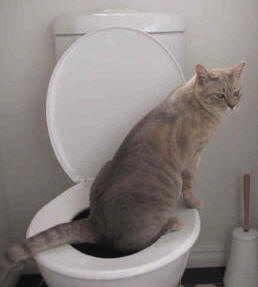Potential Issues of Flushing Cat Poop Down Your Toilet - Protect Your Plumbing
Potential Issues of Flushing Cat Poop Down Your Toilet - Protect Your Plumbing
Blog Article
What are your beliefs on How to Dispose of Cat Poop and Litter Without Plastic Bags?

Intro
As pet cat owners, it's vital to bear in mind how we deal with our feline good friends' waste. While it may appear convenient to flush feline poop down the commode, this practice can have harmful effects for both the setting and human health and wellness.
Alternatives to Flushing
Fortunately, there are much safer and extra liable means to deal with cat poop. Think about the complying with options:
1. Scoop and Dispose in Trash
One of the most usual method of throwing away feline poop is to scoop it into a biodegradable bag and throw it in the trash. Make sure to make use of a committed litter inside story and get rid of the waste immediately.
2. Usage Biodegradable Litter
Go with biodegradable cat litter made from products such as corn or wheat. These litters are environmentally friendly and can be securely dealt with in the trash.
3. Hide in the Yard
If you have a backyard, take into consideration hiding pet cat waste in a marked location away from vegetable gardens and water sources. Be sure to dig deep enough to stop contamination of groundwater.
4. Mount a Pet Waste Disposal System
Invest in a pet garbage disposal system especially created for cat waste. These systems use enzymes to break down the waste, reducing smell and environmental impact.
Health Risks
Along with environmental concerns, purging feline waste can likewise pose health threats to people. Pet cat feces may contain Toxoplasma gondii, a parasite that can create toxoplasmosis-- a possibly serious disease, particularly for expectant ladies and individuals with damaged immune systems.
Environmental Impact
Purging cat poop presents unsafe microorganisms and parasites right into the water system, positioning a substantial danger to aquatic ecosystems. These pollutants can negatively affect aquatic life and concession water high quality.
Conclusion
Liable animal possession prolongs past supplying food and shelter-- it also involves appropriate waste monitoring. By refraining from flushing cat poop down the toilet and choosing different disposal approaches, we can minimize our ecological impact and protect human health and wellness.
Why Can’t I Flush Cat Poop?
It Spreads a Parasite
Cats are frequently infected with a parasite called toxoplasma gondii. The parasite causes an infection called toxoplasmosis. It is usually harmless to cats. The parasite only uses cat poop as a host for its eggs. Otherwise, the cat’s immune system usually keeps the infection at low enough levels to maintain its own health. But it does not stop the develop of eggs. These eggs are tiny and surprisingly tough. They may survive for a year before they begin to grow. But that’s the problem.
Our wastewater system is not designed to deal with toxoplasmosis eggs. Instead, most eggs will flush from your toilet into sewers and wastewater management plants. After the sewage is treated for many other harmful things in it, it is typically released into local rivers, lakes, or oceans. Here, the toxoplasmosis eggs can find new hosts, including starfish, crabs, otters, and many other wildlife. For many, this is a significant risk to their health. Toxoplasmosis can also end up infecting water sources that are important for agriculture, which means our deer, pigs, and sheep can get infected too.
Is There Risk to Humans?
There can be a risk to human life from flushing cat poop down the toilet. If you do so, the parasites from your cat’s poop can end up in shellfish, game animals, or livestock. If this meat is then served raw or undercooked, the people who eat it can get sick.
In fact, according to the CDC, 40 million people in the United States are infected with toxoplasma gondii. They get it from exposure to infected seafood, or from some kind of cat poop contamination, like drinking from a stream that is contaminated or touching anything that has come into contact with cat poop. That includes just cleaning a cat litter box.
Most people who get infected with these parasites will not develop any symptoms. However, for pregnant women or for those with compromised immune systems, the parasite can cause severe health problems.
How to Handle Cat Poop
The best way to handle cat poop is actually to clean the box more often. The eggs that the parasite sheds will not become active until one to five days after the cat poops. That means that if you clean daily, you’re much less likely to come into direct contact with infectious eggs.
That said, always dispose of cat poop in the garbage and not down the toilet. Wash your hands before and after you clean the litter box, and bring the bag of poop right outside to your garbage bins.
https://trenchlesssolutionsusa.com/why-cant-i-flush-cat-poop/

As a serious person who reads about Can You Flush Cat Poop Down The Toilet?, I assumed sharing that excerpt was worth the trouble. Sharing is nice. You won't know, you will be doing someone a favor. Thanks a lot for your time. Visit again soon.
Customer Reviews Report this page